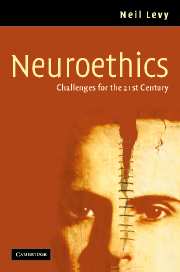Book contents
- Frontmatter
- Contents
- Preface
- Acknowledgements
- 1 Introduction
- 2 Changing our minds
- 3 The presumption against direct manipulation
- 4 Reading minds/controlling minds
- 5 The neuroethics of memory
- 6 The “self” of self-control
- 7 The neuroscience of free will
- 8 Self-deception: the normal and the pathological
- 9 The neuroscience of ethics
- References
- Index
7 - The neuroscience of free will
Published online by Cambridge University Press: 16 December 2010
- Frontmatter
- Contents
- Preface
- Acknowledgements
- 1 Introduction
- 2 Changing our minds
- 3 The presumption against direct manipulation
- 4 Reading minds/controlling minds
- 5 The neuroethics of memory
- 6 The “self” of self-control
- 7 The neuroscience of free will
- 8 Self-deception: the normal and the pathological
- 9 The neuroscience of ethics
- References
- Index
Summary
Can neuroscience, and the other sciences of the mind, shed light on one of the oldest and most difficult of all philosophical problems, the problem of free will and moral responsibility? Some scientists believe it can. In their popular writings, these scientists often express the opinion that the sciences of the mind have shown that free will – and therefore moral responsibility – is an illusion. They argue, roughly, as follows: the sciences of the mind demonstrate that our thoughts, intentions, and (therefore) our actions are the product of deterministic processes, in the following sense: given the initial conditions (say, our genetic endowment at birth and the environment into which we were born), we had to act as we did. But if we were determined to act as we did, then we were not free, or morally responsible. Richard Dawkins, the great evolutionary biologist, has recently compared our practices of praising, blaming and punishing to Basil Fawlty's behavior in flogging his car for breaking down, in the TV series Fawlty Towers:
Doesn't a truly scientific, mechanistic view of the nervous system make nonsense of the very idea of responsibility, whether diminished or not? Any crime, however heinous, is in principle to be blamed on antecedent conditions acting through the accused's physiology, heredity and environment. Don't judicial hearings to decide questions of blame or diminished responsibility make as little sense for a faulty man as for a Fawlty car?
(Dawkins 2006)- Type
- Chapter
- Information
- NeuroethicsChallenges for the 21st Century, pp. 222 - 257Publisher: Cambridge University PressPrint publication year: 2007



